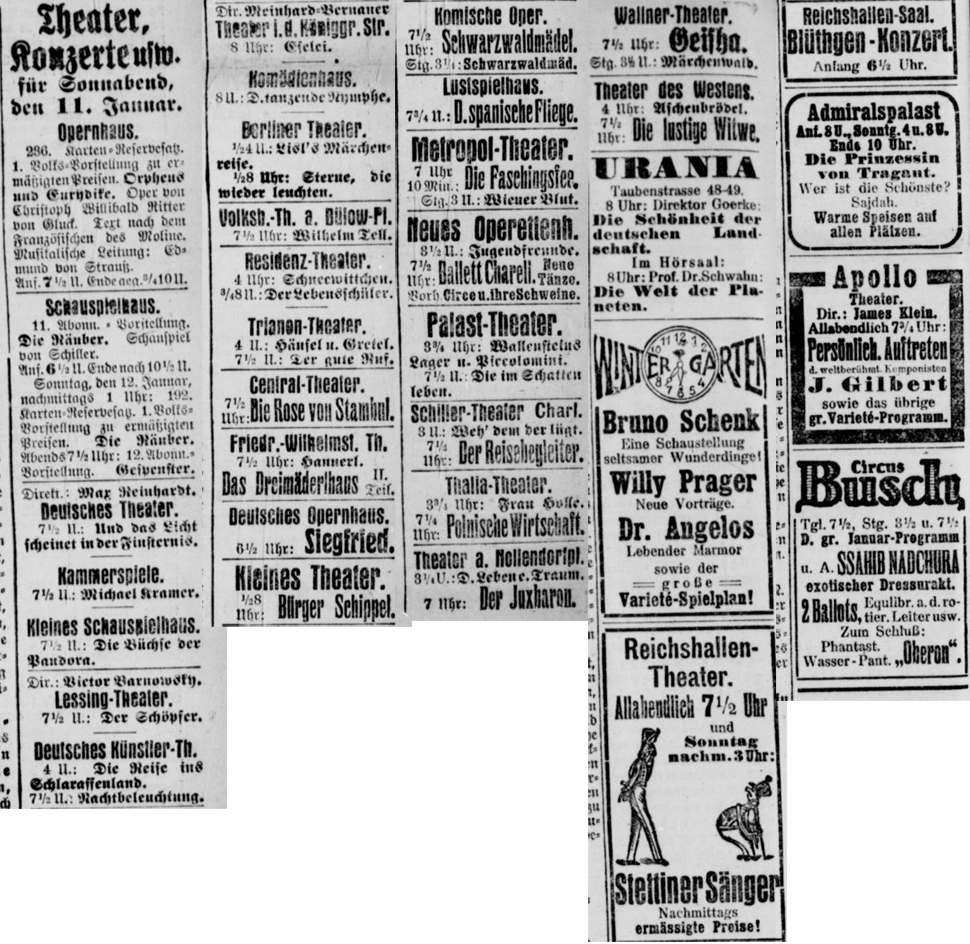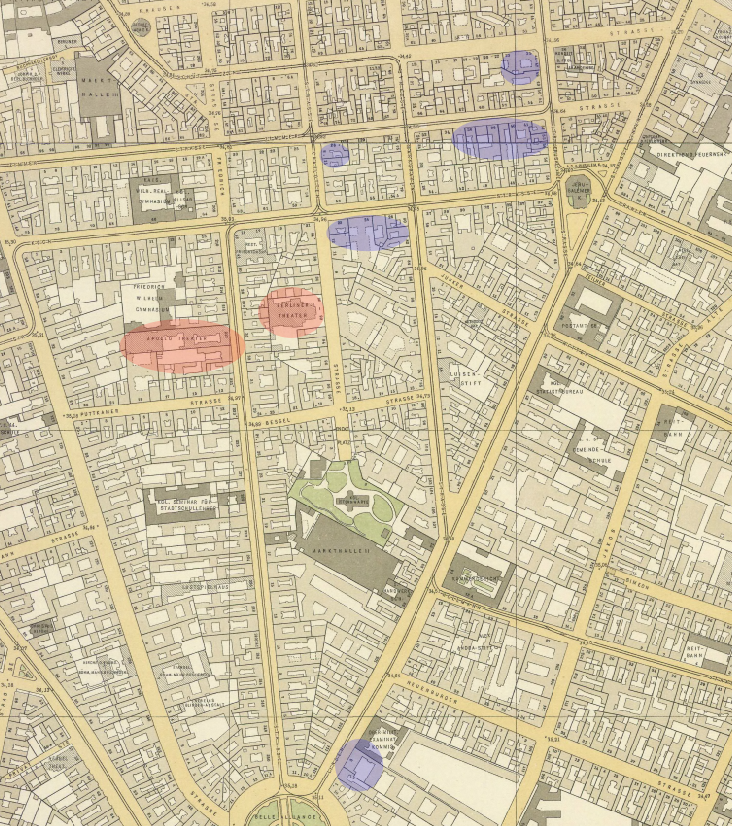Saturday, 11 January 1919
This was the weekend when the government abandoned all negotiations with the striking and occupying protesters and turned to outright violence: by Sunday, all occupied buildings had been stormed by “Freikorps,” the heavily armed paramilitary volunteer forces assembled almost immediately after the war ended in November 1918. It was a detrimental weekend for relations between the left-wing parties, and would cast its shadow over the entire Weimar period: the command to attack, and, it seems, the command to execute protesters, was given by Gustav Noske, a Social Democrat. The murder of Rosa Luxemburg and Karl Liebknecht the following week has remained a central event in German political history, but armed conflicts continued after that; Noske’s notoriety was cemented two months later, when his brutal quashing of another wave of armed unrest in March left over 1,200 protesters dead.
At the risk of sounding like a broken record: that none of this appears to have affected the theatres and popular performance venues is really remarkable. Or maybe it actually did, in not instantly obvious ways. It’s hard to believe that no shows were received differently under these circumstances than they might have been even weeks earlier. When the Schiller-Theater Hamlet opened in October 1918, for instance, one critic found the play newly topical: “‘Time is out of joint!’ cries the Danish prince, and we are touched to the quick; for what the poet is having this one figure feel and experience before our eyes, our entire people feels and experiences now: to be or not to be, that is the question” (or rather, in the German translation, that is the question here, “das ist hier die Frage” — a suddenly weighty adverb). Seeing the same show three months later, with public order truly out of joint in the streets near the theatre, that effect must surely have been heightened. Similarly, The Cherry Orchard must surely have taken on a new weight under the circumstances, must surely have felt at least slightly less far removed in its setting and subject matter, even for the audience of manual and white-collar workers that the Volksbühne was designed for: if the sound of the trees being chopped down mingled with the sound of gunshots in the street (did it?), how can that not have affected one’s response to a play that was read by all of its reviewers in political terms? And what did it mean for the Volksbühne to stage that play in the middle of the January uprisings?
What, for that matter, did it mean for them to put on Schiller’s Wilhelm Tell the next day, today, on January 11 — a play that deals, after all, with an individual resisting an oppressive regime? When the production opened in late November 1918, it didn’t seem activist enough to Ulrich Steindorff, writing in the Socialist daily Freiheit: “four weeks earlier” — before the fall of the German monarchy, that is — Wilhelm Tell “would have been a revolution play for the Volksbühne. Now it is a reactionary piece.” From Steindorff’s political perspective, Tell’s struggle is too personal: he takes action against an oppressive tyrant, not against a system of tyranny. The only thing that prevented the show from “drifting by in irrelevance” were the passionate pleas for the values of freedom “hurled with overwhelming violence towards the 3,000 people of the Berlin Volksbühne” by Stauffacher, the political figure that, as far as the critic is concerned, ought to be at the centre of a contemporary take on the play (the Volksbühne held barely half as many spectators as that, but never mind). Tell himself is no “leader for these times.” But what about the performance on January 11? Is it too far fetched to imagine that at least some of the Volksbühne spectators would have seen Gessler, the tyrannical ruler in Schiller’s play, as a version of Noske, or vice versa, and would have thought of Tell’s resistance against arbitrary violence as a version of the protesters continued resistance against violent suppression? In November 1918, the critic reviewing the production in the more moderately left-wing Vorwärts identified the dying nobleman Attinghaus’s plea to his fellow rebels — “Seid einig — einig — einig”: “Unify — unify — unify” — as the central line of the show, but how would that line have registered two months later, when Social Democrats were killing Social Democrats in the streets?
The play certainly could be made to trigger violent responses, as Leopold Jessner would discover at the Staatstheater in December, in a different venue, with a different set of regulars in the audience. But if the Staatstheater’s old court-theatre crowd could be upset by Jessner’s portrayal of the nobility, might the Volksbühne crowd not have responded with renewed sympathy to staged cries for freedom, whether political or individual, on the eve of the violent quashing of such cries among their peers and comrades? And might the Volksbühne leadership not have known that they were courting that kind of response? Could programming Wilhelm Tell on 11 January 1919 have been a wholly innocuous, non-political decision?
A little belatedly, here is the listing of today’s performances, from the Berliner Börsen-Zeitung:
Besides the Volksbühne Tell, there are other plays that may have been read differently in those days of turmoil than before: I continue to wonder about the Palast-Theater’s Die im Schatten leben (see the post from two days ago). When the Volksbühne came under new artistic leadership in the 1918/19 season, this play about oppressed workers was one of the documents of “proletarian struggle” that was explicitly suggested as the kind of drama they ought to be staging. But the Palast-Theater was a huge, primarily commercial entertainment theatre, home to Otto Reutter’s famous revues during the war (which started out as patriotic and became more melancholy over time — but certainly never an occasion for revolutionary fervour); by 1919, it belonged to the film giant Ufa (and would soon be converted into a cinema). And yet it somehow became the venue not just for The Mikado, which seems like a perfect fit, but also for The Shadow-Dwellers, which does not. Was there money to be made with proletarian discontent, and the Palast-Theater capitalized on that? Also, what exactly was the Staatstheater up to in deciding to stage their production of Schiller’s The Robbers, his most fervent, most Sturm-und-Drang-driven play — and not once, but twice, including an afternoon performance, at reduced prices, on Sunday? It was an older staging, first produced in November 1917, and, given its courtly origins, surely not a subversive one: but how would it have been received in the new context? As appeasement? As a provocation? As mere costume drama of minimal relevance?
A final thought: the Apollo-Theater, day after day, throughout this week, advertised its variety program and “personal appearances” by the “world-famous composer J. Gilbert.” I don’t know who this was — the only composer whose name and initial match is the American James L. Gilbert, whose most well-known song was “Bonnie Sweet Bessie,” but he was dead already in 1919. But whoever he was, those “personal appearances” must have been quite unlike what he might have expected. The Apollo-Theater and the Berliner Theater across the road from it were almost in the epicentre of the January street fights, on the very edge of the newspaper quarter where most of the occupations took place (theatres are marked in red, occupied buildings in blue):
To hear Gilbert perform, or to see the afternoon fairy-tale show at the Berliner Theater, audiences would have had to pass barricades such as this one, on the corner of Charlottenstrasse and Zimmerstrasse:

Then again, the Apollo-Theater was used to turning calamity into entertainment. In November 1918, as the German monarchy was collapsing and the inevitability of military defeat became inescapable, it staged a huge variety show on theme of global demise: “Die Welt geht under,” “The world is ending.”
- Click to email a link to a friend (Opens in new window)
- Click to print (Opens in new window)
- Click to share on Facebook (Opens in new window)
- Click to share on Twitter (Opens in new window)
- Click to share on Tumblr (Opens in new window)
- Click to share on LinkedIn (Opens in new window)
- Click to share on Reddit (Opens in new window)
- Click to share on Pinterest (Opens in new window)
Recent Comments
- Premodern Performance-based Research: A Partial Bibliography – Alabama Shakespeare Project on My Trouble with Practice-as-Research
- Premodern Performance-based Research: A Partial Bibliography – Alabama Shakespeare Project on Where is the Theatre in Original Practice?
- Alex on Steven Moffat, Sherlock, and Neo-Victorian Sexism
- Tim Keenan on Where is the Theatre in Original Practice?
- Holger Syme on 1920s Berlin Theatre: Research Marginalia 1
Archives
- November 2021
- April 2020
- March 2020
- October 2019
- January 2019
- December 2018
- November 2018
- October 2018
- March 2018
- February 2018
- January 2018
- July 2017
- May 2017
- March 2017
- November 2016
- October 2016
- September 2016
- August 2016
- June 2016
- May 2016
- January 2016
- December 2015
- November 2015
- October 2015
- September 2015
- August 2015
- July 2015
- June 2015
- May 2015
- February 2015
- January 2015
- November 2014
- October 2014
- September 2014
- August 2014
- July 2014
- May 2014
- April 2014
- March 2014
- February 2014
- January 2014
- November 2013
- October 2013
- September 2013
- August 2013
- July 2013
- May 2013
- April 2013
- March 2013
- January 2013
- December 2012
- November 2012
- October 2012
- September 2012
- August 2012
- July 2012
- April 2012
- March 2012
- February 2012
- January 2012
- December 2011
- November 2011
- October 2011
- September 2011
- August 2011
- July 2011
- June 2011
- May 2011
Copyright

Holger Syme's work is licensed under a Creative Commons Attribution-NonCommercial 3.0 Unported License.Images may be reused as long as their source is properly attributed in accordance with the Creative Commons License detailed above. Many of the photos here were taken at the Folger Shakespeare Library; please consult their policy on digital images as well.



